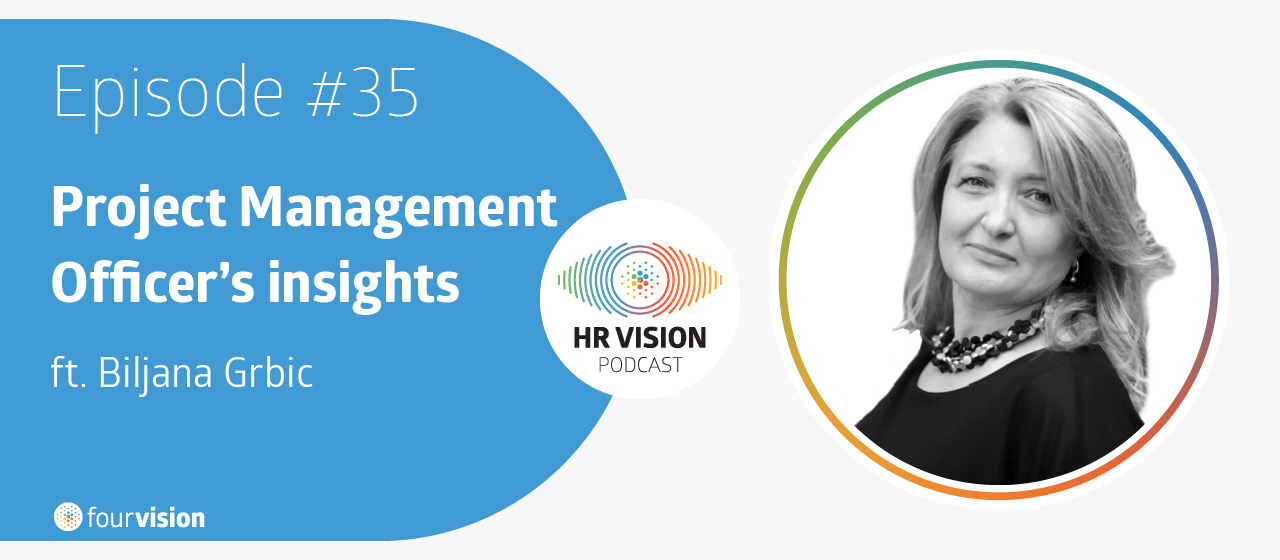This week we stepped away from HR Tech for a moment, and talked about Project Management processes. Especially because they’re also important to HR Tech implementations!
Biljana Grbic is our PMO (Project Manager Officer). She has more than 15 years of experience in project management processes, and she came in so we could get a pick into the world of PMOs.
In this episode we get to know her and her view on the Project Management Officer role, the important skills to have, the common challenges she’s seen, and what can the future hold for this crucial role.
Ivo:
Hey everyone, and welcome to the HR Vision podcast. I'm your host Ivo and every week I'm going to have a conversation that matters about HR, this week I have Biljana Grbic with me welcome Biljana. How are you doing?
Biljana:
Hi Ivo, I'm okay. How are you?
Ivo:
I'm good. I'm doing good. Thank you for coming in. Biljana is our PMO or project manager officer. She has more than 15 years of experience in project management processes, and today we're going to get to know her and get a peek into the world of PMOS. So you're ready, Biljana?
Biljana:
Yes!
Ivo:
right good. So let's get to it Then, let's start like we normally start with a small introduction about you. Tell us a bit about yourself and your professional background.
Biljana:
yeah, 1st to start with my personal. Born in raised in Serbia. Graduated in economics, also in Serbia. I moved to the Netherlands 23 years ago. I'm mother of two daughters. 23 years old and 14 years old living in Amersfoort, together with my partner and youngest one. about my professional part. When I came to the Netherlands, I started in one big international company and I started basically on as a finance department, but soon it turns that we needed some kind of support of our project management as project management. PMO. Had only a financial part of the check of the financials in a project, but not really supporting a part of the PMO. So we started to think about how we can fill this gap between project manager and financial control of the project. So then I started one big account and there I started to see. How I can support a project manager. So just for people that don't know what is PMO basically supports. Project manager on a project that is the client. PMO, but you have also some kind of internal PMO. What is supporting organization and supporting project manager with internal processes? So that is think what I am doing? Basically for fourvision and I'm trying to support all internal standards. Process is what is. Defined by fourvision and to be in line with what is being done on the project manager side. So there's some kind of link between Project manager and internal process.
Ivo:
OK, alright. Just going back to the fact that of course you have a background in economics, you're working the financial side of things that PMO, or the transition that happened in that international company was something very natural. You applied inside the company. How did that happen? Or certainly just there was this need? I'm gonna take it over.
Biljana:
Yeah, second one yeah that one because we needed to see how we can improve our process, what we are basically also doing in a by fourvision. And then, we show that there is a need to, some kind of support to make for project matter easier to Do all internal processes on a right time and right manner. So that was some kind of natural, Rising of the role. PMO. And then after it was a PMO department born, the company and then we started to do on also smaller projects. So that is the way how it works, but Basically it is not really something that maybe I will need to change something. You know that was really natural, but I like it.
Ivo:
OK, alright yeah, because you never looked back right it's you never went back to the financial side of things can I ask you why was that? Did you just enjoy more working with processes and involving people with that?
Biljana:
Yeah, I think that when you're doing financial, most of the things you are busy only with the numbers and not really the people, so that is something what make easier to work when you are also engaging with different people and also my expertise in finance helps because I know also what is happening when you need to invoice something and not just you need to produce invoice and that's it. But also use invoice with the details that you have and what it means and what is behind that. That is also a really handy for PMO, so I can then maybe think about more improvements and more things. What can be do better, when you have a some kind of a finance experience.
Ivo:
Yeah are aware of the financial implications that a project can also bring on and how to deal with that in a cost efficient way. I guess.
Biljana:
Yeah indeed.
Ivo:
Alright. My next question is about being a PMO. What is it like for people not knowing what it is, what do you think are the must haves for someone to be a successful PMO?
Biljana:
For me what's what I think that it's important that we know what are the procedures in a company. That is really important because you need to deal with this internal process, but you need also to remind project manager to deal with them. And also to if it's something not going how it is supposed to be, you can then also know what consequences it will have. But also to find a way to help in solving the of the potential problems.
So you need to have broad knowledge. Yeah, everything inside the company. Also you will need to be analytical. You need to see what the numbers mean and what are also the consequences. So when you change something, when there's something changing, when something is not inside the rules. You need to be accurate as well, but you also need to find a way to deal with changing. Because many people are asking from you different things and you you need to switch from one to another and that is something what can be challenging as well.
Ivo:
I can imagine. And do you think there are some communication skills involved in terms of are taking care more about the processes, or you also need to take care of the people aligning with those processes and making them follow those processes. Is that correct?
Biljana:
Indeed, yeah. That is something what you need you need to try to engage people in a process as well. Also engage people in my role as well. My role is also important for a company not just because I want it. Yeah, so I need to have social skills to engage people where we are working with. What I'm trying to do is just to go in a conversation. Online when we have online with video, because it is helping, you can see facial expressions. You can see the person that you are talking. Also the other side can see you, so that makes it less difficult to engage with each other as we are not sitting in the same room.
Ivo:
Yeah definitely. Actually, that was one of the the questions that I had for you. First of all, what are the most common challenges that you find in being being at PMO? And how do you keep people engaged in this remote world?
Biljana:
First of all, I think first thing what we can do is just go on video. Because it helps. It's a small thing, it helps in communication. Also to get your things done right. Project manager said they know of first time when I speak with somebody I say, really let me know if you have any question because I was also started here from scratch. Nobody can really tell me how it works in a company. So when you start somewhere you need really to spend a lot of time to search for information. And in this process of last eight months I really gained a lot of information what can help other people and I'm really happy to share it.
Ivo:
Yeah so first what I'm telling to new project managers please just reach me if I don't know. Maybe I can help you to find somebody who knows how to answer your question, but those kinds of things. And then I'm also seeing that people are coming to me with the question also information and also that kind of question that that is important for me as well in my role. Because then I can give more context on a project, what we are delivering.
Yeah, I can imagine. Do you think like being remote, besides making yourself more available for those questions, do you try to book more meetings with people just to keep the conversation going more often than probably in an office environment, you would need to?
Biljana:
Yeah, I'm trying to have a regular meetings with project managers and also they know and they are planning additional ones if needed as well, so I don't see any problem with that so. Basically, with people that I'm working with, I'm in a constant contact and communication so we don't have any problems to find each other when needed and also on a regular basis as well.
Ivo:
I understand. Regarding the role of a PMO, not all companies have them, but there are plenty of companies that have them. What do you think like, especially like in this area like we are in consultancy implementation all that what do you think like the main value of having a PMO? Of course your biased. We all know, you're a PMO. But you know what do you think it's the greatest value of having a PMO or someone to look over the processes and to implement those processes, making sure they are fulfilled. What do you think?
Biljana:
I think that all companies that are working on a project need to have a PMO. Of course, the smaller companies don't need it. But for example, in FourVision, in one moment you cannot manage all those projects, so PMO should be involved. Because project managers need to be more oriented to delivery of the projects and less on internal processes. Of course then needs to know what are the internal process and which procedures need to be followed.
But the main task will be delivered with the project and the profitability of the projects as well. So that is something what you just need when you grow up as a company and a project manager cannot manage all those internal processes, so that's something that is necessary.
Ivo:
Yeah, at some point you just have to have someone to oversee the whole the whole process and make sure that deliveries are fulfilled as well. Alright, and what do you think are the most common challenges to be a PMO? What are the things that are hard to deal with in your day to day work or you know stuff that you need to overcome and it's very common in the PMo work life.
Biljana:
Yeah, I think that if you cannot switch from one to another topic that can be challenging for you. For me it's not really problem, but what I experienced when you need to think about improvements you need to have focus time and that is most of the time during your 8 hours work. Yeah, and if you are all the time, ask about something, you need to help people. You need to support in, you have meetings.
That is really sometimes really challenging to block a time in your agenda to say that is really my focus time without having the feeling that you're doing something. Yeah, it's not your role, but yeah, that is maybe just me.
Ivo:
Yeah, you have the feeling that you're constantly putting out fires, right? And you don't have time for anything else.
Biljana:
Indeed, so that is for me. I speaking for myself, but our role is really to stretch from one another and to answer questions, support. So if you need really to work on something, you need to have that focus time. And that's for me, not really easy all the time to plan. I'm just plan it and then we are getting something that is urgent and I need to replan. But as topics where I'm working on, are improvements in what we need, so I am then making a for me my myself also urgent and my manager is aware of, and then I just need to plan and to put myself on do not disturb and to have a chance to focus on these topics. So that is something that I need to work on still.
Ivo:
OK OK, fair enough. Let's talk a bit about technology. Did you use many tools during your life as PMO, different tools to manage projects? Actually, you never used a lot of technology? It's not very common in the PMO World. How is that landscape?
Biljana:
I think that we cannot run away from technology in any role. As a PMO as well and I'm trying to use all tools that are available? What can help me in my role? Of course that depends on your role. On a company on what is available, what is not available. So you need to really find what you can use and what is what you can optimally use, so you can you can have big tools that nobody is looking at. So basically you are just wasting your time. But for the PMO role it's really important that you can keep and if it's a simple Excel sheet. That is also in which all stakeholders can look at and find that information that can work as well. So technology of course you need for all other roles.
Ivo:
Talking about technology you. I've from what I've seen in your experience, FourVision is your first contact, I guess, project management for HR technology. What has been your experience so far? What have you learned? Did you know there was so complex not so complex as you expected? What is your feeling so far in this world of HR technology?
Biljana:
HR technology didn't have any experience, only just as a user.
Ivo:
Yeah, yeah, like booking your holidays and those things.
Biljana:
Yeah, holiday requests, logging requests, that kind of thing. But for me it's a really important that I know of what the company is working on, so I'm trying to gain some knowledge on my level, what I think that is needed for me. And I'm also reading the the contracts for example. And yeah, I'm really interested in what we are selling. and what is difference between one and another projects and also, uh, sometimes I'm looking on presentation what our new functionality in different products are; What were we are selling to the customer.
So it is not really something that I don't know, because all of us are using our some kind of process of HR, but I think that it's interesting for me. It's interesting to see what we are selling. So yes, in a certain way I'm in.
Ivo:
Yeah! You're still learning, I guess, but did you? Did you have any expectations about it? Did you know already, like how complex it could be? You know, talking about, I don't know recruitment platforms and and performance management tools and succession planning those things. Did you ever expect that it could be as complex as it is?
Biljana:
It's still really complex for me and feel stable, so I don't really have a sort goal to understand everything, but for my role, how much is needed? Yes, for sure I will gain some knowledge and I'm asking question. Or functional consultants, and I'm also in the meetings where there is talk about technical things. Some some things I can understand. Some things not, but in the big picture I can understand what is what is about. Yeah, it is also OK with me.
Ivo:
That's fine! Just one last one last thing. Now regarding the position of PMO. Do you think the position is going to change or is going to keep being fundamentally the same in the future, so looking into the future, do you think it will be more technology integration? Do you think there's any possibility of automation within PMO processes and those things? What is your perspective looking into the future?
Biljana:
Yeah, I think that the PMO process will be automated in a big level. Because we need just to check what is happening with the hours, what we what is happening with the invoices, profitability and those kinds of things. You can just keep track in the tools now.
Later it will be automated, that is sure, but for now we need and somebody needs to make it automated. So for now we have enough work to do, but I think that will be done by just a tool.
Ivo:
Interesting, so you do you feel like. At some point it might happen that companies need less PMO's?
Biljana:
I think so. For sure, but not now. But some kind of FourVision company that'll just work on automation of PMO process right? And then just think about the sort of app. What can this right?
Ivo:
But don't you think iou will need someone. To oversee that tool, like to make sure that his automating the process is in the right way. Maybe not a PMO, but maybe a project manager of that tool, I don't know.
Biljana:
Indeed. Super PMO! For sure, somebody needs to make the requirements for that tool right and then somebody needs to check if it's working. So it will not just disappear PMO, but I think it will bring us to our role to another level. So that is what I'm thinking but it can take really long. Or maybe not.
Ivo:
Maybe not. Who knows and by that time. Maybe you will have focus time. Again, you know.
Biljana:
Long focus time each day.
Ivo:
Yeah indeed, alright Biljana. This was basically all I had for you. I think it was very insightful. I learned a lot about the world of PMO that I didn't know that much about. Maybe we can talk a bit deeper once again the future. I really appreciate your time. Thank you so much for coming on. I hope you enjoyed it.
Biljana:
Yeah sure, thank you Ivo.
Ivo:
Thank you Biljana. Alright, thank you so much. Guys listening out there, we'll see you next time.
Sign up to receive email updates
Enter your name and email address below and I'll send you periodic updates about the podcast.







